Stolen Future: Part 3
Fighting back by speaking out
About the series
Lonni Schicker, 64, was always the one to depend on, to get things done and to figure things out. She was the person who took care of others. At least until about five years ago, when Lonni's doctor told her that at age 59 she had mild cognitive impairment. The diagnosis placed her at higher risk of dementia. Lonni quit her job as a professor and moved into an apartment in Fenton with her son. Her problems have since gotten worse. Hoping to help others, Lonni is sharing her story about her frustrating search for a diagnosis and unique challenges when symptoms strike at a younger age.
Listen
Michele Munz reads the third story in her series about Lonni Schicker and her struggles with dementia. Lonni, an educator, copes with her condition by teaching others and lobbying on behalf of patients.
Lonni Schicker walked through the doors of the Ritz Carlton in her sparkling black pantsuit and into the throngs of gowns and tuxedos.
Everyone at the annual black-tie gala for the Alzheimer’s Association Greater Missouri Chapter seemed to know her. They stopped to take pictures with her, told her she looked beautiful.
She and her son Dan, wearing a bow tie and cummerbund with hints of the Alzheimer’s awareness color purple, made their way to a large circular bar. Waiters handed out champagne glasses of sparkling drinks with crystal-like sticks of rock candy.
Tom Carmody, 65, with Edward Jones, a major sponsor for the Alzheimer’s Association, approached her: “I heard you on the radio today. You were so good.”
He was particularly touched, he said, by how she described going from being a busy college professor to nothing.
“You,” Carmody said, “are kind of like the poster girl for what the issues are.”
Lonni was a special guest that night. After the dinner, she shared her story of her struggle with dementia in a video that played on the mega screens before the start of the high-dollar auction.
That morning, she also appeared on KMOX with radio host and emcee for the gala Carol Daniel.
From St. Louis to Jefferson City to Washington, D.C., Lonni opens her life to lawmakers, doctors, researchers and others like her who are suffering. She has spoken at dozens of fundraisers, meetings, training sessions, rallies and symposiums.
“I feel like I have a limited amount of time to talk about what I need to talk about,” said Lonni, 63, of Fenton. “I can’t teach, but I can teach about this.”
Four years ago, Lonni was diagnosed with mild cognitive impairment, ending her teaching career. Her symptoms have progressed to dementia.

Lonni Schicker waits patiently in her Fenton living room while a video crew sets up equipment on Wednesday, Jan. 31, 2018, to record a piece to be played at an Alzheimer's Association fundraiser scheduled for April. Since being diagnosed with mild cognitive impairment, Lonni has committed herself to being an advocate for the organization; telling people about her experience with dementia. Christian Gooden / St. Louis Post-Dispatch
Alzheimer’s disease is the most common form of dementia. Doctors are monitoring Lonni for a type of dementia known as Lewy body dementia because of the hallucinations, falls and sleep issues that accompany her memory problems. As with Alzheimer’s, there is no cure.
Lonni had her days, weeks and entire life planned. Now, she has no idea what the future holds.
“The uncertainty is the absolute worst part. It’s such an unstable disease. There’s no way to predict one day from another to how you will feel and what will be different,” she said. “There’s a certain hopelessness in knowing there’s no cure.”
She does the only thing she knows how to do with certainty: help others.
“I applied myself to talking about it and living life to the fullest and staying busy. It gives a certain amount of hope back,” she said. “At least I know I can help somebody else cope.”
Lonni had looked forward to the gala for weeks. A broken rib from a fall and a painful shingles rash on her side triggered by stress was not going to stop her. She fixed her newly dyed blond hair and put on the highest heels she could manage.
Daniel introduced Lonni to the people crowding the ballroom and announced the start of her video.
“I’m so impressed by her will to fight, her style and her commitment to the cause,” Daniel said. “If I could please turn your attention to the screens to learn more about this wonderful woman.”
Advertisement
‘Someone like you’
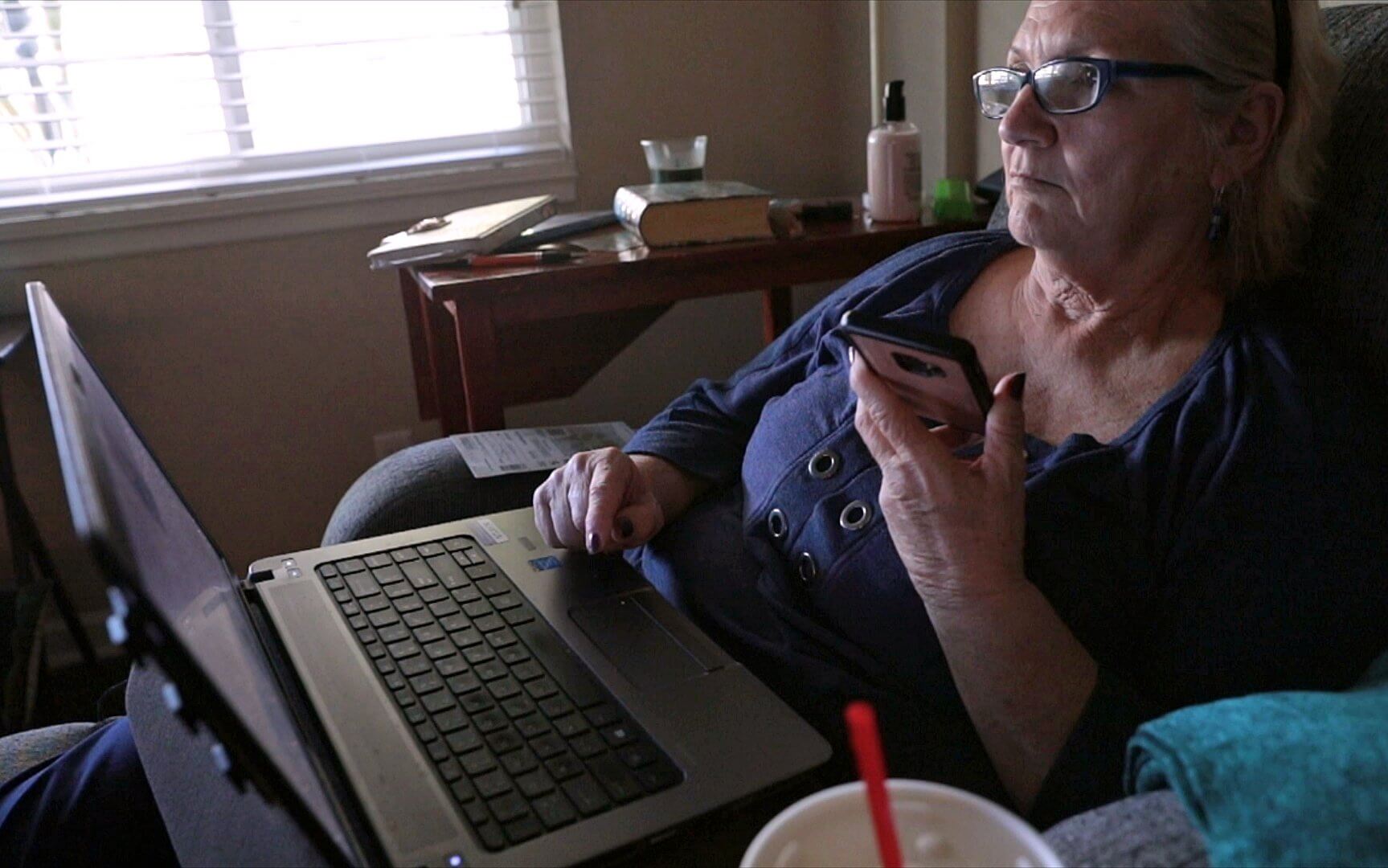
Lonni Schicker, 63, of Fenton, listens in on a conference call about a national research summit on ways to support people with dementia and their caregivers on Wednesday, June 13, 2018. Cristina M. Fletes / St. Louis Post-Dispatch
A couple of years after she was diagnosed with mild cognitive impairment, Lonni picked up the phone and called the national Alzheimer’s Association office. Her local chapter was helpful in providing support and education. But she felt like she wanted to do more.
“I wanted to get involved some way,” Lonni said. “I just wasn’t sure how.”
The person on the phone was obviously impressed. “We have this group. Are you interested?” Lonni recalled her asking. “Because we could use someone like you.”
Lonni was interviewed and chosen along with 10 others across the country to serve for a year on a national early stage advisory group for the association. The group worked to raise awareness about the early stages of dementia and advocated for more research and support programs.
“The most positive thing was connecting with people who were in the same boat and discovering the strongest sense of purpose than I ever had before,” Lonni said.
The year culminated in October with her invitation to speak at a national summit in Washington, for researchers and providers of dementia care, organized by the National Institutes of Health.
Hearing from patients about their needs was new to the annual summit, which is heavy on the latest science and breakthroughs.
A video of a speech Lonni Schicker gave in October 2017 at a research summit of the National Institutes of Health. She was invited to speak as a member of a national Alzheimer’s Association group of people living with dementia to raise awareness and advocate for support. (National Institutes of Health)
“I couldn’t depend on beauty or wit or street smarts, but I had my brain,” Lonni said in her speech. “My brain has always been the star of my show.”
She described being unable to work and the devastating medical bills, the fear she has of getting lost and of no one being able to find her. She explained how people need community programs that involve them at every stage of the disease.
“I am asking each and every one of you to remember that at the base of all of this, we’re just human beings trying our best to live with dementia with the knowledge that it’s an incurable disease,” she said, “and we are counting on each of you to find the answers.”
The nation’s top experts, who filled the auditorium, rose to their feet in lengthy applause.
Advertisement
Empowering, comforting
Cheryl Kinney, senior director of client services for the local Alzheimer’s Association chapter, said it’s critical for people such as Lonni to describe what it’s like to live with dementia.
Usually, people picture someone in a nursing home who needs lots of care, Kinney said. “She’s helping provide a whole different face to the disease.”
Lonni’s stories of how she adapts and continues to find meaning in her life show others that their lives don’t have to be all about dementia.
“When you have people like Lonni saying this is the way I’ve chosen to live my life with the disease, that can be very empowering and very comforting to individuals and families,” Kinney said.
Julie Whitley is a social worker with the Alzheimer’s Association who meets with families after a diagnosis. She is among a handful housed in medical offices as part of a new program to immediately connect families to the association’s support services.
Listen
Jason Hassenstab, an assistant professor of neurology at Washington University, discusses the process of using neuropsychological testing to help diagnose dementia.
Whitley, who works at Washington University’s Medical Diagnostic Center, sees how the stigma surrounding dementia prevents patients and their caregivers from getting help.
“I have multiple conversations with patients and caregivers who say, ‘I don’t want anyone to know. I don’t want anyone to look at me differently,’” she said.
Kinney said in her 22 years of helping families, she mostly has seen people in the moderate to late stages of the disease. But that is changing because of trailblazers like Lonni.
“With more awareness, better diagnosis and less stigma,” Kinney said, “we’re beginning to see people with early stage dementia and hearing about their wants and needs.”
“I have multiple conversations with patients and caregivers who say, 'I don't want anyone to know. I don't want anyone to look at me differently.'”
Their input has led to new support programs including telephone calls by peers, social outings, volunteer opportunities and ways to document and find meaning in their lives.
“If a person can’t work in the capacity they used to, maybe the person can volunteer at a food pantry or care for animals or read to children,” Kinney said, “so they are not sitting idle or isolated in their home, letting the disease consume them.”
Advertisement
Dirty little secret
Lonni Schicker, 63, who was diagnosed with mild cognitive impairment at age 59 and now has dementia, is an advocate for patients and their caregivers. She feels an urgency to raise awareness while she is still able. (Cristina M. Fletes / St. Louis Post-Dispatch)
In March, Lonni traveled to the Missouri Capitol to ask legislators to fund programs that would help families care for loved ones with dementia. She was among about 175 people who took charter buses to Jefferson City from across the state.
On the bus, a video played on television screens hanging from the ceiling: “If you know three facts about Alzheimer’s, you probably know more than a legislator.”
In Missouri, 110,000 people have Alzheimer’s disease — the most common form of dementia. About 70 percent live at home. More than 300,000 people are caregivers, providing more than $4 billion in unpaid care.
“Briefly share your personal story and connect your story to the ask,” the video instructed.
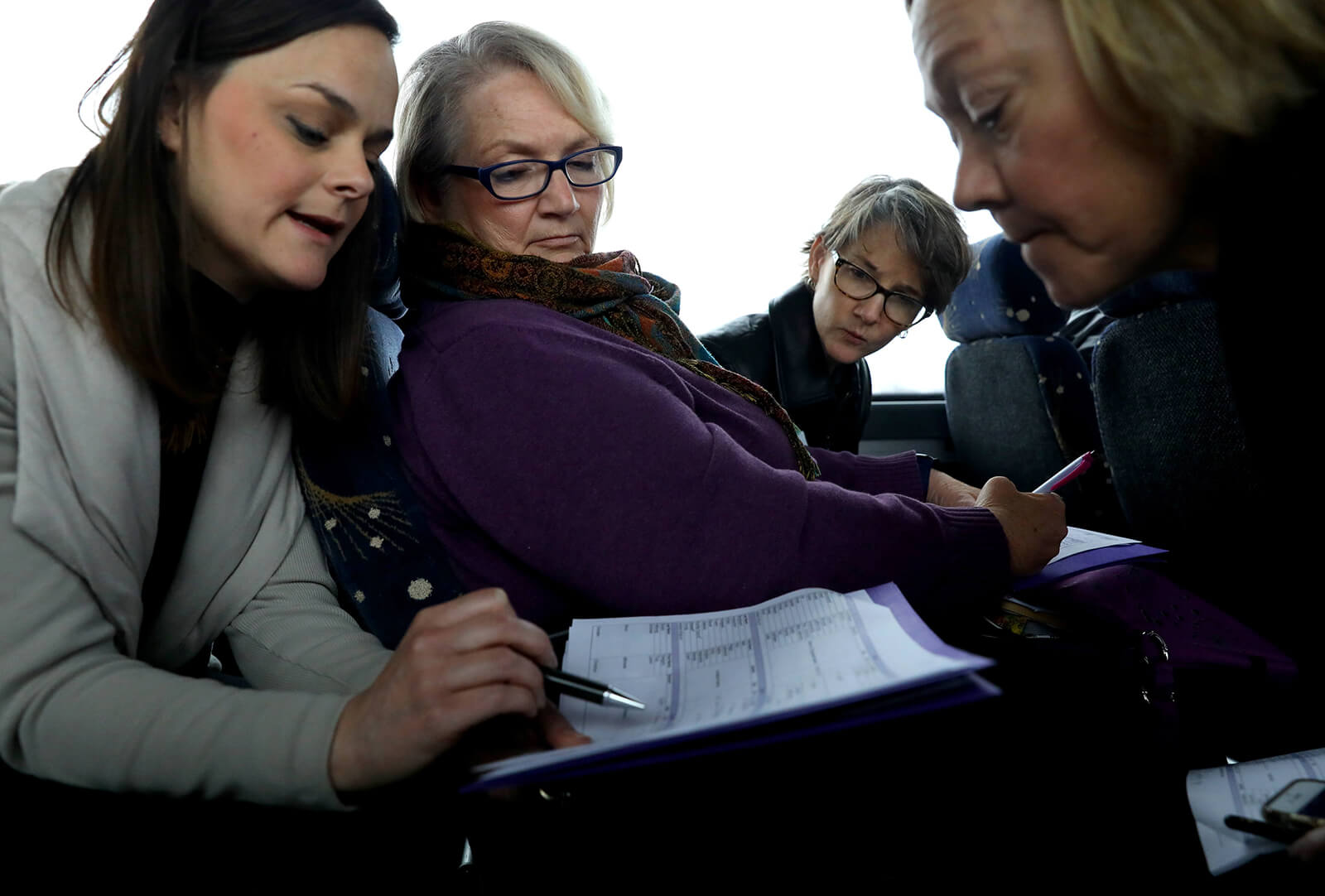
Lonni Schicker (center), goes over the logistics of a trip to the Missouri Capitol on March 7, 2018, with Eva Tucker (left), and Peggy Killian, vice president of communications, and Carroll Rodriguez, senior vice president of public policy, for the Greater Missouri Chapter of the Alzheimer's Association. Advocates lobbied Missouri legislators and had a rally in the Capitol to draw attention to their cause. Christian Gooden / St. Louis Post-Dispatch
This year, advocates were asking for two things, aimed at delaying the need for expensive nursing home care:
• Maintain $450,000 in respite assistance to help families cover the cost of caring for a loved one at home, including expenses such as incontinence supplies or adult day care services.
• Pass the Structured Family Caregiver Act to provide a daily stipend for caregivers living with and providing care for a loved one who qualifies for Medicaid.
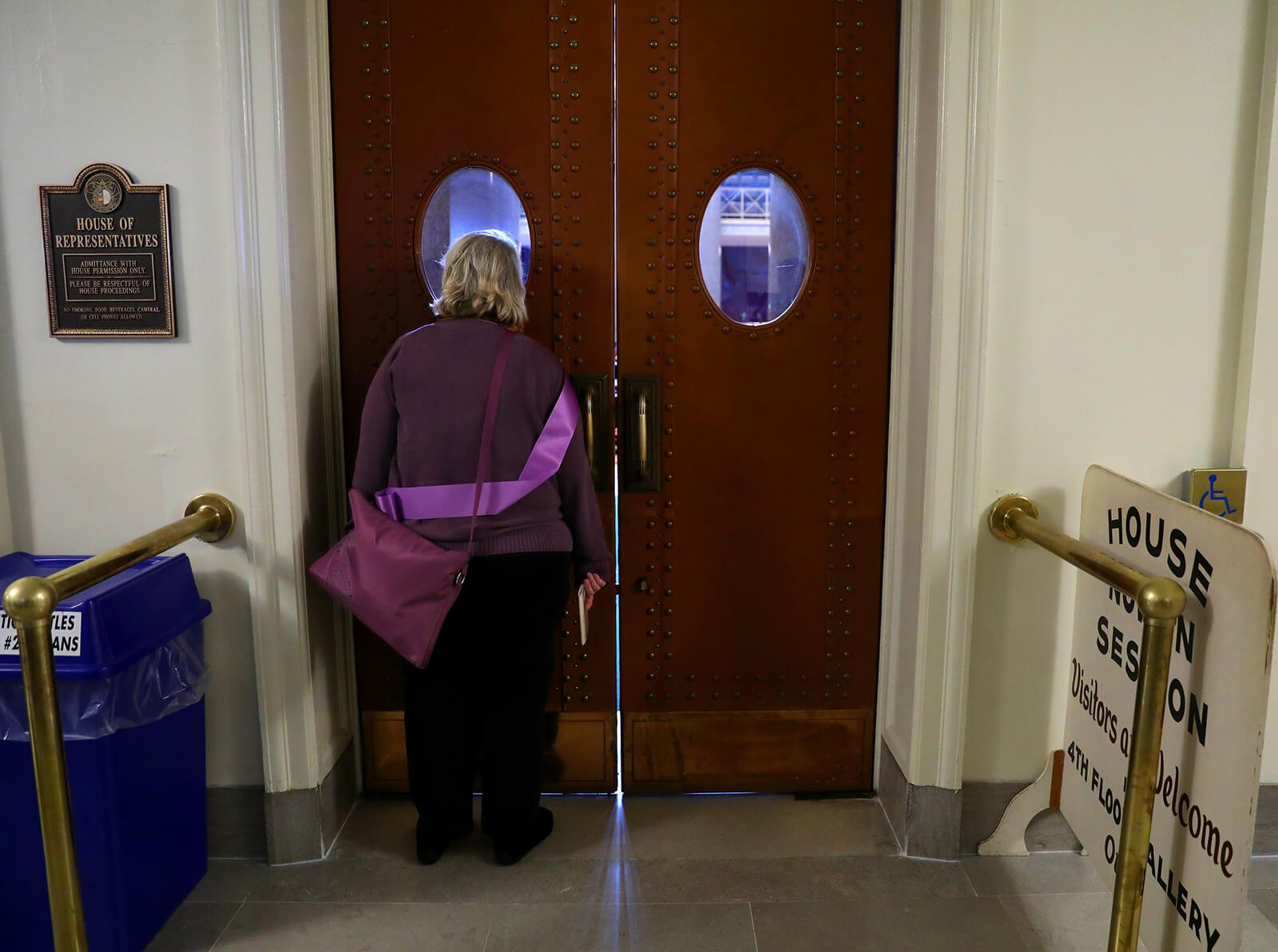
Lonni Schicker peeks at the floor of the House of Representatives at the Missouri Capitol on Wednesday, March 7, 2018. She and other Alzheimer's Association advocates went to Jefferson City to lobby lawmakers and rally for their cause. Christian Gooden / St. Louis Post-Dispatch
Inside the busy Capitol, they divided into teams to catch legislators in their offices and in the hallways. Lonni told legislators about moving in with her son, Dan, and how he worries about her being alone while he’s at work. He often needs time off to care for her or take her to appointments.
Afterward, the advocates gathered in the rotunda for speeches. Each was given a flower: yellow for caregivers, orange for supporters, purple for those who have lost a loved one to dementia, and blue for those with dementia. Lonni was among only a handful proudly holding a blue flower. Most carried purple.
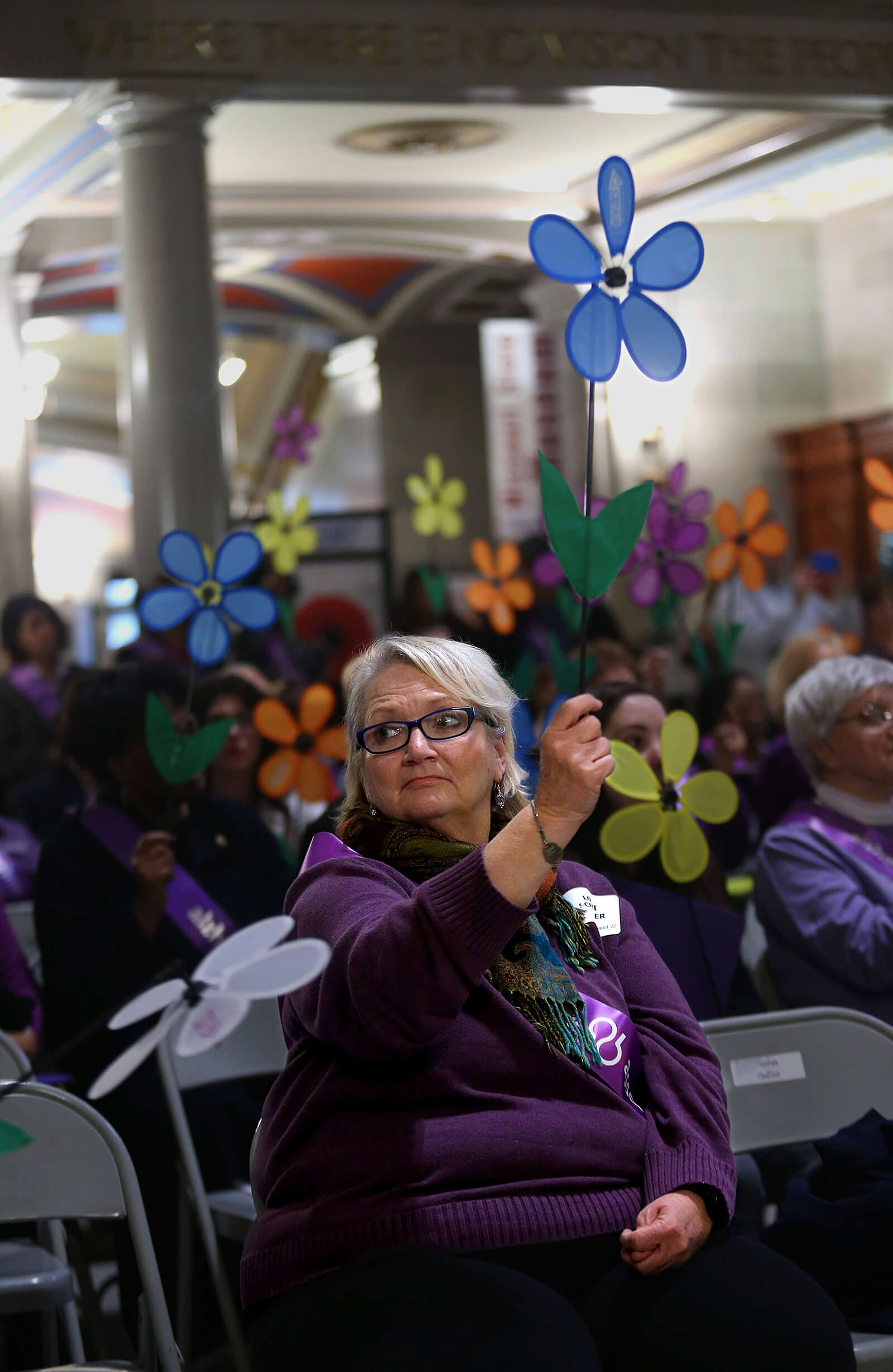
Lonni Schicker was among the advocates for people with dementia during an Alzheimer's Association program in the Missouri Capitol on Wednesday March 7, 2018. During the trip to Jefferson City sponsored by the group's Greater Missouri Chapter, hundreds of volunteers lobbied lawmakers to fund programs that would help families care for loved ones with dementia and held a rally to draw attention to their cause. Christian Gooden / St. Louis Post-Dispatch
Speaker Linda Parks, whose husband of 50 years has Alzheimer’s, told the crowd that she hopes one day there will be white flowers for those who survive the disease.
“There is only one ending to our story,” Parks said, “and that is what we have to change.”
On the bus, a man sitting behind Lonni thanked her for coming, for being courageous.
As an educator, she hardly had to think twice, Lonni told him. But she’s learning others want to stay in the shadows.
“I was shocked when I started finding out how many people have cognitive impairment or dementia, but it’s like a dirty little secret no one wants to talk about,” she said. “I thought, I’ve been doing this all my life. This would be an important thing to speak up about.”
Advertisement
‘A sense of urgency’
At the gala, a sea of silver sequined tablecloths topped with vases of dimly lit purple rocks and disco balls cast a soft glow. The video about Lonni illuminated the ballroom.
She described how she went from making six figures to living paycheck to paycheck. How she hates that her son, 32, is spending what should be the best years of his life caring for his mother.
“I feel a sense of urgency to do as much as I possibly can,” Lonni said in the video. “I want other people to feel that urgency.”
After the video ended, the crowd of about 600 people rose to their feet in applause around Lonni’s table. It was another memorable standing ovation.
The chapter raised nearly $800,000 that night for services and research, living up to its selection in January as the Crystal Award winner, the highest chapter honor awarded each year by the Alzheimer’s Association for advancing public policy, awareness, care and research.
“She is an integral part now of the Alzheimer’s Association because she wants to be. She wants to have an impact,” said Daniel, the emcee, whose own mother was diagnosed with dementia three years ago. “We all have stories, and they should fuel this fight.”
In the audience that night were a woman who worked with Lonni when they were young nurses in the burn unit at what is now Mercy Hospital St. Louis and a former student Lonni taught while earning her doctorate from Lindenwood University.
They embraced her in tears and hugs, both shocked and sad to see one of the smartest and most caring people they know describing how her brain doesn’t work anymore.
The nurse, Janie Gammon, 61, of O’Fallon, Mo., wasn’t surprised to learn Lonni had gone on to be a professor, nor that she was speaking out in the midst of her disease. “That’s just her personality and her purpose,” she said.
Lonni said seeing the women reminded her of “such good years,” but also why she is so passionate about teaching. They and many others told her she was phenomenal. She was inspiring.
“I feel like I’m at the prom or something,” Lonni said, laughing.
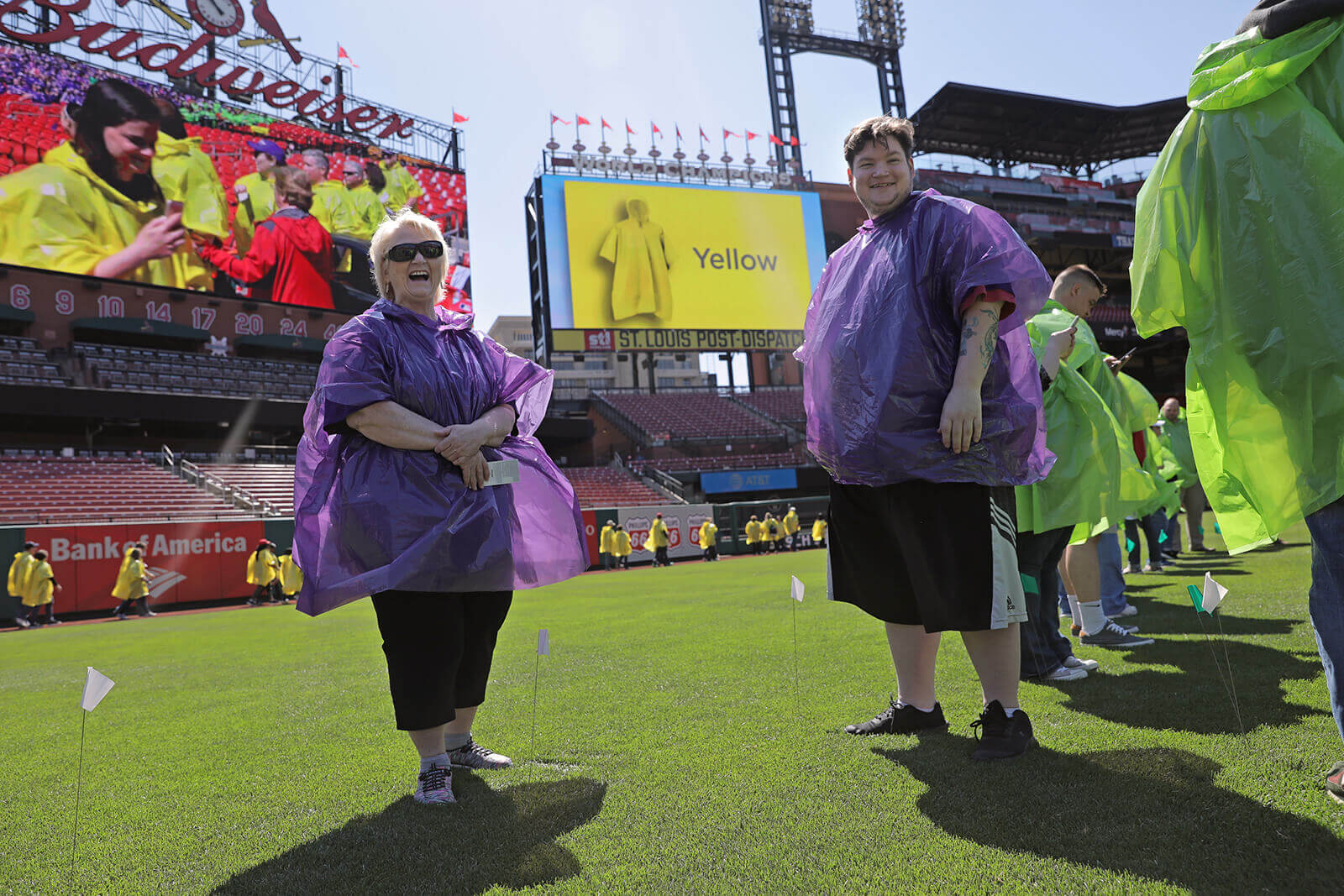
Lonni Schicker and her son Dan Schicker share a laugh as they stand in Busch Stadium with hundreds of participants waiting to help the Alzheimer's Association and Edward Jones set a Guinness World Record for the largest human image of a brain on Saturday, April 28, 2018. Participants wore different colored ponchos for different parts of the brain. The record was set with 1,202 participants. Cristina M. Fletes / St. Louis Post-Dispatch
Lonni stays in touch with some of her former students from Minnesota State University. One said she was thankful to learn her mentor is continuing to make a difference.
Samantha McDonald, 29, of Fargo, S.D., had watched Lonni’s life turn upside down when her symptoms started. Lonni felt she could no longer be a professor and abruptly moved home to St. Louis.
The gala was like the retirement party she never got.
“I'm glad she is being remembered in this way,” McDonald said. “These should be her last marks, not the end of her employment. Her employment was not the end of her career. Her career was not just her job. It was always her life.”
Fact box
The stigma around dementia
- Friends refuse to believe your diagnosis or withdraw from your life, leaving you with a feeling of abandonment or isolation.
- Family members do not want to talk about the disease, perceive you as having little or no quality of life, or avoid interacting with you.
- Others ask your care partner about you rather than ask you directly how you are doing.
- The reaction of some friends and family to your diagnosis prevents you from seeking help.
Examples of stigma's effects
The stigma around dementia can prevent people from:
- Seeking medical treatment when symptoms begin
- Receiving an early diagnosis or any diagnosis at all
- Living the best quality of life possible while they are able
- Making plans for their future
- Benefiting from available treatments for symptoms
- Developing a support system
- Participating in research
Five tips to overcome stigma
- Be open and direct. Share your diagnosis. Engage others in discussions about Alzheimer's disease and dementia and the need for prevention, better treatment and a cure.
- Learn and communicate the facts. Sharing accurate information is key to dispelling misconceptions about the disease. It can be a pamphlet or a link to online content. Participate in an Alzheimer’s Association education program.
- Seek support and stay connected. Stay engaged in meaningful relationships and activities. Whether family, friends or a support group, a network is critical. Engage with others like you in Alzheimer's Association message boards or support groups.
- Don't be discouraged. If people think Alzheimer's disease or dementia is part of normal aging, see it as an educational opportunity. Talk openly about your experiences, communicate when you need help and learn what the emotional needs of your family and friends are.
- Be a part of the solution. As an individual living with the disease, yours is the most powerful voice to help raise awareness, end stigma and advocate for more support and research. You can volunteer, help with fundraisers or participate in research.
Source: Alzheimer's Association
Questions
We're interested in hearing from readers who are living with dementia, or caring for someone with dementia. As with any conversation, keep comments polite and refrain from personal insults, foul language or off-topic remarks.
Read more about our commenting guidelines.
About this series

Michele Munz has been a reporter for the St. Louis Post-Dispatch for 20 years, the past nine covering health and medicine. As a health reporter, Munz has won awards for her coverage of midwifery care, an experimental treatment for ALS and the opioid epidemic. She was the St. Louis Newspaper Guild’s 2015 Terry Hughes Award winner.

Christian Gooden has been with the Post-Dispatch since 1999. He is a native of University City and graduate of Cardinal Ritter College Preparatory High School. He earned a degree in journalism from Morehouse College in Atlanta, Ga. He has worked at The Atlanta Journal-Constitution and the Milledgeville (Georgia) Union-Recorder.

Cristina M. Fletes is a staff photographer and videographer at the St. Louis Post-Dispatch. She received a bachelor of fine arts degree in studio art from Louisiana State University in Baton Rouge and a master's degree in photojournalism from the University of North Carolina at Chapel Hill.
Andrew Nguyen
Developer
Josh Renaud
Developer
Beth O'Malley
Audience engagement
Elaine Vydra
Audience engagement
Janelle O'Dea
Data reporter
Hillary Levin
Multimedia producer
Gary Hairlson
Multimedia director
Jean Buchanan
Projects editor
Evan Hill
Print designer
Jennie Crabbe
Copy editor
June Heath
Copy editor
Colleen Schrappen
Copy editor